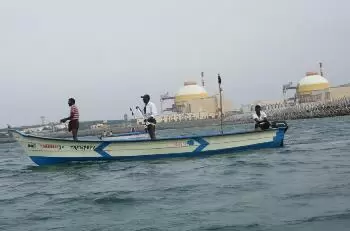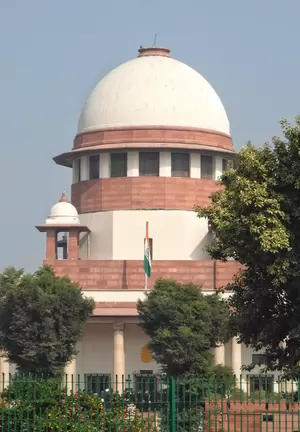UPA being guided on the wrong track, possibly towards a nuclear disaster

12-April-2013
Vol 4 | Issue 15
Prime Minister Manmohan Singh must be a great admirer of the British liberal, John Locke, who wrote in 1695, “the greatest part of people cannot know and therefore they must believe. Hearing plain command is the sure and only course to bring them to obedience.”
He is simply unable to understand that the poor fishermen, farmers and the working class in Tamil Nadu and Kerala may have a valid and independent perspective on the nuclear power project coming up at Koodankulam with Russian assistance.
 |
|
Doubts over the quality of Russian reactors have increased among fishermen since Russia has freed itself from any liability clause (Photo: Anotny Kebiston Fernando)
|
YN Dudkin, head of the Russian Specialists Group erecting the Koodankulam plant, said that theirs was the safest nuclear reactors in the world.
Under the Civil Liability for Nuclear Damage Act, 2010, the liability to nuclear operator was limited to Rs. 1,500 crore. But even this was waived in the case of the Koodankulam plant and the entire burden of liability shifted to the exchequer.
If Dudkin is so confident of the safety of the Russian reactors, why this reluctance to accept any liability?
In Russia, Sergei Shutov, a director of Zio-Podolsk, a subsidiary of public sector Rosatum, suppliers of the reactors, was arrested on charges of corruption, fraud and supplying cheap Ukrainian steel blanks and steam generators, two of which are installed in Koodankulam Unit I and II.
This is not an allegation made by the People’s Movement Against Nuclear Energy agitating against the Koodankulam plant, but charges made by Russia’s own investigation agency, counterpart of our CBI.
Rosatum has supplied similar equipment to China also, but China has started a safety audit by inspecting the quality of each component that has gone into the two reactors.
Manmohan Singh, on the contrary, made a commitment to the Russian President, Vladimir Putin, in Durban on the sidelines of the BRICS summit, that the first unit of the Koodankulam will be commissioned during this month itself, notwithstanding its shaky legal ground.
The Task Force as well as the Atomic Energy Regulatory Board had given an assurance that the 17 safety measures recommended would be implemented before commissioning of the plant.
While progress in implementing them has been slow and halting, what is the hurry in giving the nod for criticality, jargon for nuclear fission by which the nucleus of a very heavy atom like uranium or plutonium splits into two lighter nuclei, releasing energy in the process.
A hot run, penultimate step before fuel loading and criticality, was carried out in August 2011. The containment vessel of the nuclear core was found to be leaking, obviously due to the cheap Ukrainian steel blanks supplied by Zio-Podolsk. It had to be replaced.
The reactor pressure vessel is an obsolete model and is unsafe as per standards that came into being since 1990’s.
All documents on equipment supplied to Koodankulam are classified as secret, making it difficult to assess the health of the reactor. The Supreme Court had made it clear that it could stop the commissioning of the plant if it found the mandatory safety requirements were not put in place.
VVER-1000 reactors being installed in Koodankulam are third generation pressurised water reactors and even Russia has very little operational experience with them.
Similar reactors operating in Czech Republic and Bulgaria started developing what came to be called the sticking control rod problem.
The control rods, which absorb neutrons and are used to shut down reactors during operation, became deformed and could not be inserted within the stipulated time.
The Temelin-I reactor commissioned in the Czech Republic in 2000, developed sticking control rod problem by June 2006 when 51 control rods could not be inserted properly.
Acccording to MV Ramana, nuclear energy expert, “Control rod insertion failures are considered very serious and increase the likelihood of initiating events leading to severe accidents.”
Pre-Operational Safety Analysis Report (POSAR), Probabilistic Safety Assessment Report (PSAR) and other documents on Temelin were shared with Czech Members of Parliament and experts, but the Nuclear Power Corporation of India Limited, executing the Koodankulam project, declined to share documents with Members of Parliament or experts on the plea the Russian government owns these reports which the NPCIL was holding in a fiduciary capacity.
There are hundreds of parameters relevant for the safety and longevity of the Koodankulam reactor.
All those are contained in 10,000-odd pages of documents. If Russia had no objection in sharing such documents with the people of Czech Republic, why should that privilege be denied to the people of India?
Addressing an All-India Convention on “Approach To The Power Question In The Country,” organised by the People’s Committee for Safe Energy, in Chennai last week, Dr A Gopalakrishnan, a nuclear power engineer with more than five decades of experience and a former chairman of the Atomic Energy Regulatory Board, demanded an immediate investigation by a body of independent nuclear energy experts into the safety of the reactor components supplied by Zio-Podolsk to the Koodankulam plant.
“The inordinate delay in the commissioning of the plant and the silence of the AERB has substantiated our doubts about the safety and security of the plant,” he said.
More than the energy requirements of the country, what weighed in the minds of the people who lead the UPA government were personal gains, Gopalakrishnan alleged.
“They have thrown to winds the well thought out nuclear plan conceived and developed by Homi J Bhabha and Vikram Sarabhai. They wanted India to be free from the shackles of the western world which controls the uranium reserve of the world.
The Bhabha plan was to build a network of nuclear reactors to harness the vast thorium reserve of the country. But as long as we import reactors with enriched uranium fuel, we will never reach a stage where we can make use of the abundant reserves of thorium in the country,” he said.
Anil Kakodkar, former chairman of the Atomic Energy Commission, in a candid admission wrote in an article published in a Marathi daily, that America, France and Russia played the role of mediators in lifting nuclear sanctions against India, and therefore, New Delhi made deals with them for nuclear projects to nurture their business interests.
This way, India will never achieve the third stage of nuclear power growth envisaged by Bhabha on thorium, of which India has plenty, rather than on uranium, which is relatively scarce in the country and safeguard our nuclear sovereignty.
Non-functioning of the AERB came under the scanner of the Controller and Auditor-General also. In its latest report presented to Parliament, CAG blamed the Union government for not learning any lessons from the Fukushima disaster and its failure to have an autonomous and empowered regulator.
Quoting a recent independent investigation report on the Fukushima accident which confirmed that weak regulatory mechanism and oversight by the regulators were responsible for the disaster, the CAG report said, “At the policy level, AERB has not yet prepared a radiation safety policy even after three decades of its existence. Setting standards is an essential part of the functions of a regulatory authority.”
The AERB, which supervises the safety in 22 running nuclear plants in the country, has no rule making powers or authority to enforce or levy penalties in the context of nuclear safety oversight. The maximum fine of Rs. 500 the AERB can impose is too low to serve as a deterrent against such infringements.
Gopalakrishnan made a strong plea for an independent regulatory mechanism along the lines of the Nuclear Safety Authority of France, the Nuclear Regulatory Commission in the USA or the Canadian Nuclear Safety Commission.
All these organisations, though appointed by their respective governments, are free of political and corporate influence, transparent and keep the public informed regularly.
The Bill to replace AERB with a Nuclear Safety Regulatory Authority, now pending in Parliament, will be subject to government pressure and manipulation if and when enacted, Gopalakrishnan said.
Sam Rajappa is Consulting Editor, The Weekend Leader
















